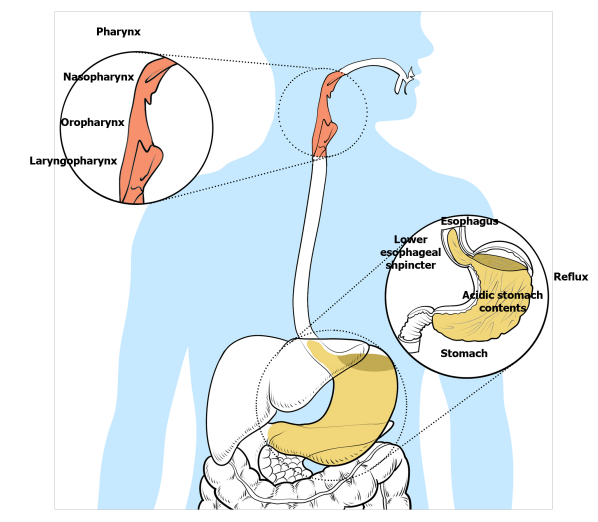
Table of Contents
Gastroesophageal Reflux Disease (GERD) is a common condition where stomach acid flows back into the esophagus, but not all cases present with the classic symptom of heartburn. Silent GERD, also known as Laryngopharyngeal Reflux (LPR), can manifest in various ways that are less obvious. Here’s what you need to know about the symptoms of silent GERD.
Silent reflux, also known as Laryngopharyngeal reflux (LPR), is a condition in which stomach acid flows back up the esophagus (swallowing tube) into the larynx (voice box) and throat. LPR is called silent reflux because it often does not cause any symptoms in the chest.

Image courtesy of National Library of Medicine
Symptoms of LPR
Laryngopharyngeal Reflux (LPR) presents in various ways, and identifying these symptoms early is critical for effective management. According to the National Library of Medicine, here are all the possible symptoms of LPR:
- Chronic cough or excessive throat clearing
- Vocal Cord Irritation
- Postnasal drip
- Dysphagia
- Coughing after eating or lying down
- Breathing difficulties or choking episodes
- Throat Sensation
- Throat Discomfort
- Globus sensation
Important: If you are experiencing persistent or severe symptoms of LPR, such as chronic cough, hoarseness, difficulty swallowing, or chest pain, do not delay seeking medical advice. These symptoms can indicate a more serious condition and require proper diagnosis and treatment from a healthcare professional.
Risk Factors
Several factors can increase the risk of developing LPR, but understanding the risks can empower you to make positive changes for your health:
- Obesity and Excess Body Weight – Managing weight can help reduce abdominal pressure and improve overall well-being.
- Hiatal Hernia – A hiatal hernia happens when the top of your stomach bulges through an opening in your diaphragm. Simple lifestyle adjustments can often alleviate symptoms effectively.
- Smoking – Quitting smoking not only strengthens the lower esophageal sphincter but also brings countless benefits to your health.
- Pregnancy – This is a temporary phase, and many find relief through tailored dietary and lifestyle choices.
- Certain Medications – If you suspect your medications might contribute, discussing alternatives with your healthcare provider can make a difference.
- Dietary Choices – Choosing a balanced diet and avoiding triggers like fatty, spicy, or acidic foods can support a healthier digestive system while still enjoying delicious and satisfying meals.
By identifying these factors, you can take proactive steps toward better digestive health and overall wellness.
Causes
The causes of silent GERD are similar to those of GERD but may be more subtle:
- Weak Lower Esophageal Sphincter (LES)
- Hiatal Hernia
- Abnormal Esophageal Contractions
- Delayed Stomach Emptying (Gastroparesis)
- Increased Abdominal Pressure
- Obesity and Excess Body Weight
- Pregnancy
- Smoking
- Certain Medications
- Dietary Factors
When to Contact Your Physician?
If you are experiencing any of the above-mentioned symptoms, it is crucial to contact your physician. They may prescribe medications such as proton pump inhibitors (e.g., omeprazole, esomeprazole, lansoprazole) or refer you to a gastroenterologist for further testing.
Diagnosis
Diagnosing silent reflux is challenging due to the lack of a definitive diagnostic test. Silent reflux is characterized by gastric contents refluxing into the pharynx or larynx, causing symptoms like chronic throat clearing, hoarseness, and a globus sensation. These symptoms often overlap with other conditions, making accurate diagnosis critical yet complex.
Initial Diagnostic Approaches
The process often begins with a consultation involving both an otolaryngologist and a gastroenterologist. Flexible laryngoscopy is a cornerstone test, helping to exclude other laryngeal pathologies like allergic rhinitis or sinusitis. Additionally, ambulatory reflux monitoring is essential to assess esophageal reflux burden. Experts recommend conducting this test without prior acid-suppressive therapy to ensure accurate results. Notably, up to 60% of patients with isolated laryngeal symptoms might not exhibit gastroesophageal reflux disease (GERD), emphasizing the need for tailored diagnostic strategies.
Challenges in LPR Diagnosis
The absence of heartburn or regurgitation in many silent reflux patients further complicates the diagnosis. Patients often undergo multiple consultations and tests before a conclusion is reached. Research indicates that the best outcomes occur when objective findings, such as disrupted anti-reflux barriers or elevated esophageal acid burdens, are present. Despite advancements, identifying true silent reflux cases remains an evolving field that requires further study.
Treatment Options
Once diagnosed, treatment options span lifestyle modifications, pharmacological interventions, and, in severe cases, surgical procedures. The choice of treatment depends on the severity of symptoms and the presence of objective reflux indicators. Further research and clinical consensus are needed to refine the diagnostic criteria and therapeutic pathways for silent reflux.
Potential Complications
If left untreated, LPR can lead to more serious health conditions, including:
- Esophagitis – Esophagitis is the inflammation or damage to the esophagus lining.
- Barrett’s Esophagus – Barrett’s Esophagus is a precancerous condition requiring immediate attention.
- Esophageal Ulcers or Strictures – Untreated LPR can result in painful complications that may affect eating and drinking habits.
Managing GERD symptoms early is the best way to prevent long-term health issues.
Final Words
LPR symptoms can significantly impact your quality of life, but it is manageable with the right approach. Whether you’re dealing with heartburn or silent symptoms, early recognition and treatment are key.
Visit your doctor for proper diagnosis, and consider trusted medications to alleviate discomfort.
Sources:
Krause AJ, Walsh EH, Weissbrod PA, Taft TH, Yadlapati R. An update on current treatment strategies for laryngopharyngeal reflux symptoms. Ann N Y Acad Sci. 2022 Apr;1510(1):5-17. doi: 10.1111/nyas.14728. Epub 2021 Dec 17. PMID: 34921412; PMCID: PMC9012673.
Cui N, Dai T, Liu Y, Wang YY, Lin JY, Zheng QF, Zhu DD, Zhu XW. Laryngopharyngeal reflux disease: Updated examination of mechanisms, pathophysiology, treatment, and association with gastroesophageal reflux disease. World J Gastroenterol. 2024 Apr 28;30(16):2209-2219. doi: 10.3748/wjg.v30.i16.2209. PMID: 38690022; PMCID: PMC11056915.
Smith RE, Sharma S, Shahjehan RD. Hiatal Hernia. [Updated 2024 Jul 17]. In: StatPearls [Internet]. Treasure Island (FL): StatPearls Publishing; 2024 Jan-. Available from: https://www.ncbi.nlm.nih.gov/books/NBK562200/
Michael M. Phillips, MD, Emeritus Professor of Medicine, The George Washington University School of Medicine, Washington, DC. Also reviewed by David C. Dugdale, MD, Medical Director, Brenda Conaway, Editorial Director, and the A.D.A.M. Editorial team.Barrett esophagus. [Updated 2022 Jul 30]. Available from:https://medlineplus.gov/ency/article/001143.htm
Also Read
Magnesium Deficiency Symptoms and Practical Tips to Manage It
Exploring 5 Proven Methods for Natural ED Treatment




